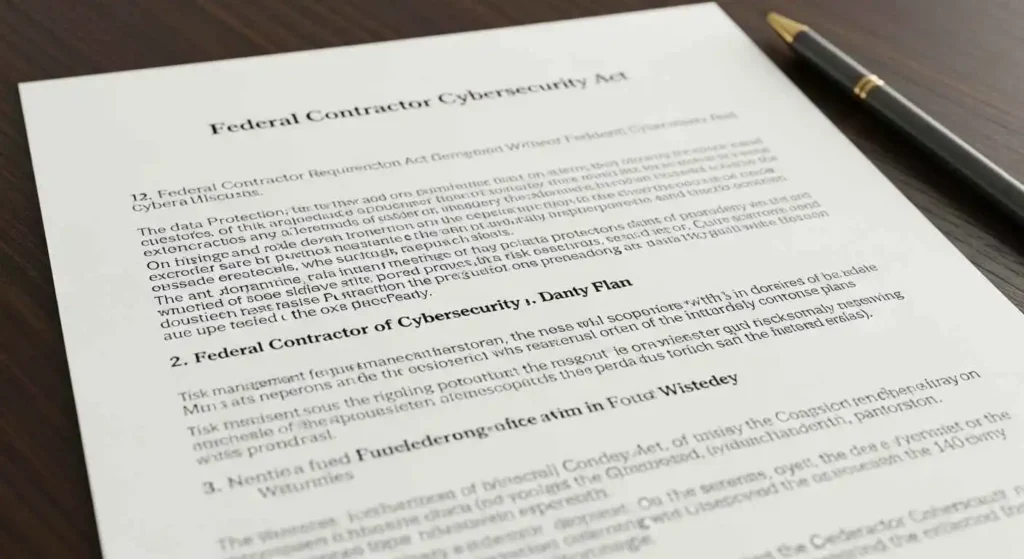Federal Cybersecurity Vulnerabilities
If a federal contractor is compromised, it’s not only about data loss or delays in projects. It could result in stolen secret information or compromised computer systems and even threats to national security. Criminals attack contractors as they’re typically the weakest link in the chain.
The reason lawmakers introduced legislation is the Federal Cybersecurity Vulnerability Reduction for Contractors Act. The House adopted the bill the following day, March 3, 2025, with broad bipartisan support. It is currently awaiting approval from the Senate.
What Does the Bill Require?
Here’s a quick overview of the main actions that contractors need to comply with if this bill is passed:
1. Implement a Vulnerability Disclosure Policy (VDP)
The bill requires that contractors adopt a VDP—a method that is structured to collect, analyse, and correct reported vulnerabilities within their systems.
-
You must trust reports from security experts or ethical hackers.
-
You must address or minimise the problems that you have identified within a reasonable amount of time.
-
This process should be conducted by NIST SP 800-216 guidelines.
2. Align With Federal Acquisition Regulation (FAR)
The Office of Management and Budget (OMB) will amend the Federal Acquisition Regulation to include updated contract conditions. The new terms will require federal contractors to adhere to the most current security protocols and to actively address weaknesses.
3. Follow Defense Rules (If You’re a Defense Contractor)
If you are a part of DoD, you must comply with the Department of Defence (DoD); your responsibilities will be in line with the latest updates on the Defence Federal Acquisition Regulation Supplement (DFARS).
Secondary Headline: Vulnerability Disclosure Policy for Contractors
Why a VDP Matters
A vulnerability disclosure policy isn’t merely a government obligation; it’s an ideal practice. Companies such as Microsoft, HackerOne, and Bugcrowd already have these policies in place, and they support the legislation. These policies:
-
Help organisations discover issues before hackers do.
-
Your clients and your partners know that you care about security.
-
Enhance trust with the government agencies.
Secondary Headline: NIST Guidelines for Contractor Cybersecurity
The bill is heavily based on the advice of the NIST—the National Institute of Standards and Technology—to establish cybersecurity standards. Contractors, that’s:
-
It is essential to categorise your vulnerabilities, prioritise them, and reduce the risks.
-
It is essential to document your process.
-
You should be prepared to undergo external audits or reviews.
In observing NIST rules, you’re demonstrating to your government that you manage an honest, secure business.
Secondary Headline: Is This Just a Government Thing? No—It Affects the Private Sector Too
Although the bill is primarily about Federal contractors however, its effects are likely to extend beyond government contracts. A lot of private firms collaborate with or depend on vendors who are also serving in the government. This means that cybersecurity best practices will be standardised across different sectors.
“The bill is likely to improve cybersecurity across the broader market,” says Jim Richberg, Head of Cyber Policy at Fortinet..
Step-by-Step Guide: How to Prepare Your Business for the New Law
Here’s a short checklist to assist your business in preparing in preparation for the Federal Contractor Cybersecurity Bill:
Step 1: Create a VDP
-
Make use of the CISA template to get started. CISA Template to start.
-
Create a secure channel for submission.
-
Set up the roles and deadlines for handling the reports.
Step 2: Conduct a Gap Analysis
-
Review your current security situation against the NIST SP 800-216.
-
Look for missing policies as well as weak procedures or obsolete software.
Step 3: Train Your Team
-
Everyone, from IT staff to senior management, knows how to manage security issues.
-
Think about the possibility of the need for cybersecurity awareness.
Step 4: Monitor Legislative Updates
-
Monitor the progress of the bill’s implementation via Congress.gov. Congress.gov site.
-
Get announcements from CISA or your local procurement office.
Secondary Headline: Why Compliance Is a Competitive Advantage
Complying with this Federal Contractor Cybersecurity Bill can protect you from trouble; it could aid you in winning more business.
-
Stronger cybersecurity means better protection for your clients.
-
The government agencies tend to award contractssecureured suppliers.
-
Private sector customers are also likely to trust you more.
Don’t wait for the law to be passed; get involved now.
FAQ Section
What exactly is a cybersecurity professional?
The term “cybersecurity contractor” refers to a cybersecurity professional who can be a privately owned firm or a professional who is employed by an agency of the government or a private business to guard information systems, data, and infrastructure from cyberattacks. They are typically responsible for monitoring networks, identifying weaknesses, implementing security protocols, and responding to cyber-related incidents. A lot of employees are being required to adhere to the highest security standards as a result of new laws, such as the Federal Contractor Cybersecurity Bill.
Are cybersecurity laws federal?
Security is an important top priority for the federal government. This is because the U.S. government, through agencies such as the Department of Homeland Security (DHS) and the Cybersecurity and Infrastructure Security Agency (CISA), creates policies and national strategies to safeguard vital infrastructure and federal systems. The efforts extend to federal contractors, specifically with legislation such as the Federal Contractor Cybersecurity Vulnerability Reduction Act.
Final Thoughts
The Federal Contractor Cybersecurity Bill is more than just another rule-making tool. It’s an essential step towards strengthening our nation’s defences against cybercrime. If your business has a relationship with or plans to collaborate with government agencies, becoming current will help you save time, stress, and money in the long run.
If you adopt the practices of vulnerability disclosure that adhere to NIST guidelines and create your team, you’ll be in the best position to be successful in the ever-changing cybersecurity environment.

